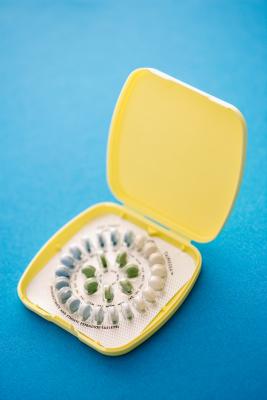Oral contraceptives, usually referred to as birth control pills, are a convenient, safe and effective means of preventing unwanted pregnancies. Birth control pills can be more than 99 percent effective when used correctly, according to the American Congress of Obstetricians and Gynecologists. Birth control pills can become effective within seven days of beginning a regular regimen, and the contraceptive effects typically wear off soon after discontinuing their use.
Function
Conception occurs when sperm encounters a mature egg, typically in the woman’s fallopian tube. The fertilized egg moves down into the uterus where it attaches itself to the lining and continues to grow through the various stages of fetal development. Birth control pills contain hormones that cause a thickening of cervical mucus , makes it difficult for sperm to penetrate the cervix. These hormones may also cause a thinning of the uterine lining, which prevents a fertilized egg from attaching. In both cases pregnancy is unlikely to occur.
Time Frame
Birth control ills come in a number of different types, each using different formulations and combinations of hormones. Most types provide effective contraception after seven days of continuous use, but some become effective after the first day. You may begin ovulating again immediately after you stop taking birth control pills, although most women require four to six weeks before they begin having normal menstrual cycles again. Talk to your health care provider to determine how soon your brand of birth control pills becomes effective and when their effects are expected to wear off.
Considerations
A healthy, fertile couple who engage in regular sexual intercourse can expect to conceive within 12 months of ceasing the use of birth control pills. Conception may occur within the first month, but some health care providers recommend waiting until you have resumed your regular monthly cycle before trying to become pregnant. No known harm has been reported to either the mother or child from a pregnancy that occurs immediately after stopping birth control pills. Your pregnancy wil be easier to date if you have re-established your regular cycle.
Misconceptions
Birth control pills are up to 99 percent effective in preventing pregnancy, but they will not protect you against any form of sexually transmitted disease, including HIV. You may become pregnant while using birth control pills if you take them incorrectly, which includes skipping a day or taking the pill at different times during the day. Birth control pills are not all the same, and not all types are appropriate for all women. Talk to your health care provider to determine the right birth control pill for you.
Benefits
Birth control pills offer a safe, effective, convenient and low-cost means of reversible contraception. They are appropriate for women who may wish to become pregnant at some later time, but who do not wish to become pregnant now. Other benefits of using birth control pills for contraception include the possibility of lighter, more regular menstrual periods. Some types of birth control pills may help reduce your risk of endometrial or ovarian cancer. They may also reduce the incidence of menstrual cramping and help to improve your complexion.





